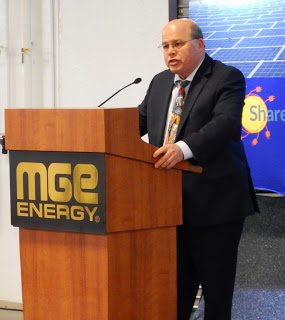
by jboullion | Jan 30, 2017 | Uncategorized
 |
| Middleton Mayor Kurt Sonnentag |
The largest shared solar array serving a Wisconsin
investor-owned utility provided the occasion for a thank-you to subscribing
customers at the Middleton Operations Center January 29th. Notwithstanding
overcast conditions outside, Madison Gas & Electric CEO Gary Wolter and
Middleton Mayor Kurt Sonnentag beamed with
gratitude as they spoke to the customers who signed up to purchase a
share of the output from the utility’s first grid-connected solar generator.
Said Mayor Sonnentag: “Today on the roof of this
facility it’s great to have a “Shared Solar” partnership with MG&E that
enables community members to receive the benefits of solar without having to
place it on their house.”
Wolter noted that that this collaboration with the City of
Middleton and its own residential customers is a key component of its
Energy2030 framework. Under this framework, MGE aims to supply 30% of electric sales
with renewable energy by 2030 and to reduce carbon dioxide emissions 40% from
2005 levels by 2030.
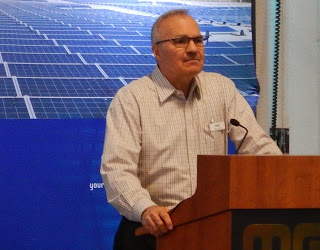 |
| Madison Gas & Electric CEO Gary Wolter |
Visible from U.S. Highway 12 northbound, MGE’s 500 kilowatt
(AC) array consists of 1,728 panels, and has been producing electricity since
early January. Madison-based H&H
Solar designed and constructed the project, which includes inverters
manufactured in Milwaukee. Also in 2016, H&H Solar designed and built a 97
kilowatt (kW) solar electric system that sits atop the Middleton Police
Station. All told, City of Middleton facilities now host more than 600 kW of
solar generating capacity, the most among Wisconsin municipalities.
Any residential customer could take part in MGE’s Shared
Solar program, but subscription levels were capped at 50% of a customer’s usage
up to a total of three kilowatts. At the same time, MGE structured the program
to allow customers to enter with a relatively low up-front payment ($47.25/250
watts; $189/kW). Even though the solar energy rate starts out higher than
standard electric service, it remains fixed over a 25-year period. Over time,
rate increases could whittle down the price gap to the point where solar energy
becomes less expensive than standard service.
In the end, it took MGE only four months to fully subscribe
the output from its first shared solar array. Customers interested in future
shared solar programs can
put their names on a waiting list.
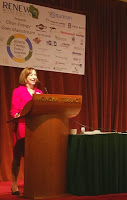
by jboullion | Jan 24, 2017 | Uncategorized
Largest Ever Summit Shows Excitement, Bright Future
By Katherine Klausing, Engagement Manager
On Thursday January 19, RENEW Wisconsin hosted its largest ever Renewable Energy Policy Summit, entitled “Clean Energy Goes Mainstream.”
Approximately 300 people and over 50 sponsoring organizations gathered for the sixth annual event in Madison to hear a diverse set of perspectives on the growing clean energy economy, from military leaders and farm cooperatives to utility executives and solar developers.
“This has been a great year for renewable energy in Wisconsin, with the most solar installed ever, increased attention on biogas and a new wind farm under construction. We’re really pleased that the Summit reflects that excitement,” said Executive Director Tyler Huebner.
 |
Barbara Nick
of Dairyland Power Cooperative |
Keynote speaker Barbara Nick, CEO of Dairyland Power Cooperative, kicked off the speakers, explaining that the cooperative’s recent large investments in wind and solar will allow it to decrease its reliance on coal. “With or without the Clean Power Plan, with or without regulation, we have a strategy that we will diversify because it’s just plain good common business sense,” Nick said.
On the morning panel, Amy Heart, director of public policy at SunRun, led a discussion about the economic and security benefits of mainstream clean energy. Department of Defense Engineer Gregg Herman explained what the US Army Reserve is doing to meet the DoD’s ambitious renewable energy goals, including building a 125 kilowatt solar array in Milwaukee. Larry Ward, executive director of the Michigan Conservative Energy Forum, spoke about his experience working with GOP lawmakers to pass a bill raising the state’s renewable portfolio standard and expanding energy efficiency. The energy independence and job creation benefits that clean energy brings align well with conservative principles, Ward said.
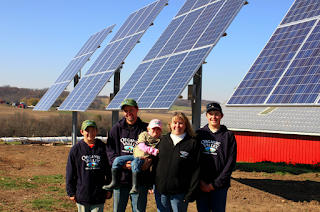 |
Organic Valley Cooperative members take
advantage of solar energy. Photo credit: Organic Valley. |
Stanley Minnick, energy services manager for Organic Valley, the nation’s largest organic farm cooperative, highlighted how incorporating renewable energy into family farm practices makes them more financially sustainable. “Having solar on their farms makes it more likely that a son or daughter will be able to take over the farm from their parents,” Minnick said. He pointed out that renewable energy jobs are living-wage jobs that can really make a difference for families. “This industry has changed my life and my family’s lives.” For more information on Organic Valley’s renewable energy efforts, see our blog.
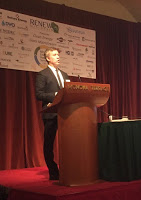 |
Adam Browning
of Vote Solar |
Adam Browning, a national leader on solar policy and executive director of Vote Solar, gave the afternoon’s keynote address, following recognition of some of Wisconsin’s best renewable energy installations of 2016. Browning highlighted some of the bright spots in Wisconsin’s solar market, like Dairyland Power’s innovative model that allows its member cooperatives to piggyback on utility-scale solar developments as a way to offer cost-effective shared solar programs to their customers. “I wish we had that in California,” he said.
Browning pointed to state policy as a critical driver for solar growth, in addition to efforts by industry leaders such as Apple, Facebook and Google who have all committed to using 100% renewable energy. These corporate renewable energy policies will produce downstream opportunities and benefits for individual families too: “what’s good for the Google is good for the gander,” he joked.
The afternoon presentations concluded with a panel discussion featuring Laura Caspari, of SoCore Energy, Jeanne Hoffman of the City of Madison, Jeff Ripp of the Wisconsin Public Service Commission, and Teran Smith of EDP Renewables. SoCore Energy is building 14 solar arrays in Wisconsin for Dairyland Power, while EDP Renewables is responsible for the new Quilt Block Wind Farm being built in southwest Wisconsin, the state’s first wind farm development since 2011. Ripp highlighted Wisconsin’s $20 million RFP for new biogas initiatives, while Hoffman pointed to Madison’s recent efforts on solar, as well as a new 100% renewable energy resolution.
“This past year was great for clean energy in Wisconsin, and I’m honored to help RENEW celebrate its 25th Anniversary,” Huebner said. “I’m optimistic about what 2017 holds.”
For more information on the event, we invite you to view press coverage from:
Channel 3000: Renewable Energy Conference Focuses on Working with Agriculture
Wisconsin Public Radio: A Wisconsin Utility Executive Pledges Less Reliance on Coal
WisBusiness: Wisconsin Must Plan for Carbon-Restricted Future, Industry Experts Say
Wisconsin Public Radio: A Conservative Touts Renewable Energy
Midwest Energy News: Adam Browning Q+A – Bright Spots and Opportunities for Solar in Wisconsin
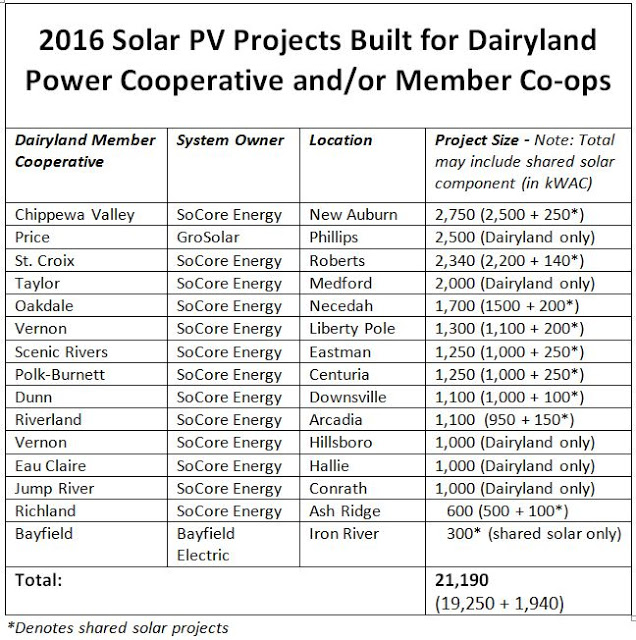
by jboullion | Jan 16, 2017 | Uncategorized
FOR IMMEDIATE RELEASE
January 16, 2017
More information
Tyler Huebner, Executive Director
608.255.4044 x 1
tyler.huebner@renewwisconsin.org
The biggest and best renewable electric installations in 2016 are set to be recognized at RENEW Wisconsin’s annual Renewable Energy Summit this Thursday, January 19th in Madison. The recognition ceremony will take place at 12:45 PM, during lunch. The Summit will be held at the Monona Terrace in Madison; registration starts at 8:00 AM and the program runs from 9:00 AM to 3:30 PM.
As strong a year as 2015 was for Wisconsin solar installers, 2016 shattered records for total capacity added, with several electric providers, led by La Crosse-based Dairyland Power Cooperative and many of its member cooperatives, generating most of the momentum. Between utility-scale projects on the one end to residential rooftop installations on the other, Wisconsin’s solar output will more than double the previous year’s totals.
Indeed, since last year’s Summit, construction started on more than 30 megawatts of solar panel installations, which will generate enough electricity to supply about 5,000 Wisconsin homes’ annual electricity usage.
The recognition will be bestowed across three categories:
Utility solar. In 2016 Dairyland Power Cooperative entered into contracts to purchase the output from 14 solar arrays under construction in Wisconsin, with a combined capacity of nearly 19 megawatts. On top of the capacity serving Dairyland, many member cooperatives agreed to additional panels to supply their shared solar programs. All told, Wisconsin’s electric cooperatives committed to more than 21 megawatts of solar last year.
Two Madison-based investor-owned utilities, Alliant Energy and Madison Gas & Electric, brought three arrays online in 2016. When it was energized, Alliant’s solar array in the Town of Beloit became the largest solar-powered generator in Wisconsin. Madison Gas & Electric’s shared solar project came about through an innovative partnership with the City of Middleton, whose rooftops now holds more than 600 kW of solar, as the City police station added an array in addition to the larger MG&E Shared Solar project.
Landmark and innovative initiatives. National corporations, state-based businesses, Wisconsin communities, and local activists continued their progress in embracing solar energy to advance public policy goals and/or enhance their business profile. In 2016, several noteworthy initiatives and collaborations were launched that married clean electricity productions with other objectives such as economic competitiveness, job training, and community-building.
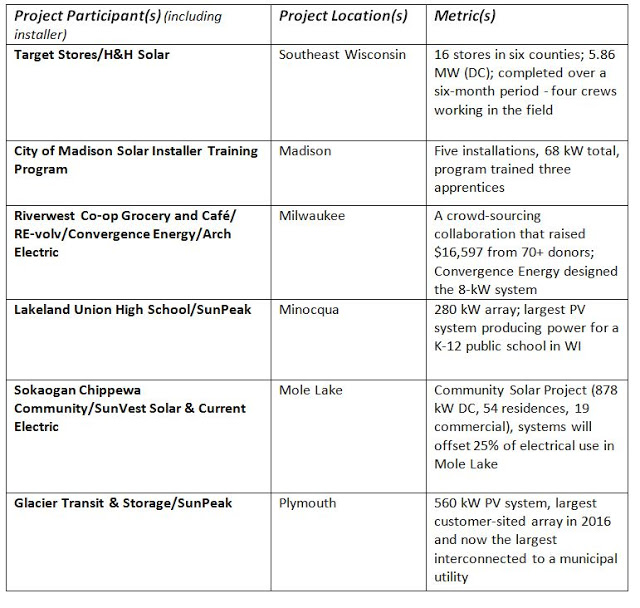
Residential solar group purchase programs. Cities and nonprofit organizations collaborated to launch four community-based solar group purchase programs, spanning from Eau Claire in the northwest to Racine in the southeast. Solar group purchase programs are designed to reduce the cost and complexity of installing solar panels on individual houses, while sharing the benefits of increased marketing and community involvement. By the end of 2016, these four programs resulted in 139 households committing to install more than 600 kW of solar on their properties, far outpacing previous years’ totals.
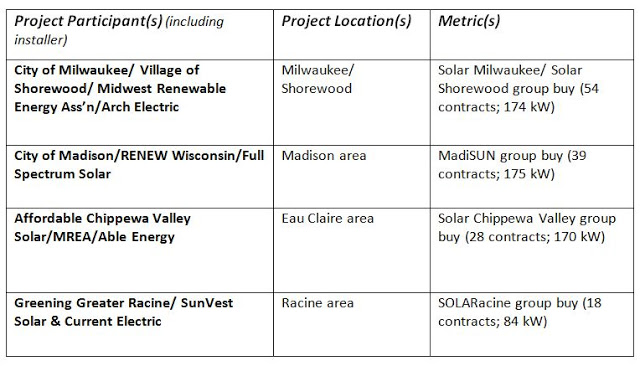
“Wisconsin solar energy saw its best year ever in 2016, with the projects installed and under construction more than doubling the state’s total production,” said Tyler Huebner, RENEW Wisconsin’s Executive Director. “But we can’t stop here, because our neighboring states are growing even faster than us. In 2017, we will also see the welcome development of wind energy and biogas investments come back to Wisconsin. Increasing our renewable energy investments and usage will help build a stronger, cleaner economy for Wisconsin.”
For more information on the 2017 Summit program agenda, speakers, and registration, please visit http://www.renewwisconsin.org/2017_Summit/.
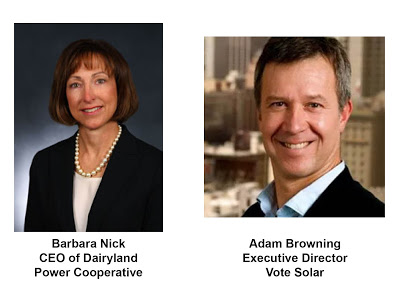
by jboullion | Dec 20, 2016 | Uncategorized
Event to Spotlight Mainstreaming of Clean Energy
Immediate release
December 20, 2016
More information
Tyler Huebner, Executive Director
608.255.4044 x 1
tyler.huebner@renewwisconsin.org
RENEW Wisconsin will host its sixth annual Renewable Energy Policy Summit on Thursday, January 19th, 2017, at Monona Terrace in Madison. The theme of the event, “Clean Energy Goes Mainstream,” will highlight the significant expansion of renewable power underway in Wisconsin, both at the customer and utility level.
This one-day event will feature two keynote speakers.
– Barbara Nick, CEO of La Crosse-based Dairyland Power Cooperative, which has entered into contracts to supply its member co-ops with renewable electricity from a
large wind power project in Lafayette County and 14 solar arrays across
western Wisconsin. Barb will explain why Dairyland decided to accelerate
its own clean energy transition and how its new sources of solar and
wind energy will benefit its member cooperatives.
– Adam Browning, Executive Director of Vote Solar, which is working to make solar power the go-to energy resource in all 50 states. As the afternoon keynote, Adam will highlight solar’s dramatic expansion in recent years, including its impact on the national economy and on local economies throughout the United States. He will also discuss the critical role that state policy will play in maintaining solar’s momentum.
Ms. Nick will kick off the summit program with her keynote address, followed by a panel session discussing the driving forces behind the clean energy transition and its broadening appeal among homeowners, businesses, and policymakers.
After lunch, RENEW will recognize the most noteworthy clean energy installations launched or energized this year in Wisconsin, as well as the individuals, organizations, and communities that made them happen.
Adam Browning will launch the afternoon program with his keynote, followed by an industry panel session examining the factors propelling the clean energy expansion, and identifying the mix of policies and practices for sustaining that expansion.
The program will feature networking opportunities with exhibitors and attendees, as well as a social hour following the close of the formal program.
RENEW Wisconsin’s Executive Director Tyler Huebner says, “We chose this year’s theme to highlight the acceleration of clean energy across corporate America, utilities, and everyday homeowners. Solar energy is poised to continue its growth in Wisconsin, while wind power and biogas appear on the verge of making comebacks. All these resources are cost-effective today, and can provide significant value to Wisconsin if deployed more aggressively.”
Summit registration is open and over 150 individuals have already signed up. Rates are $120 for Members of RENEW Wisconsin, $150 for non-members, $90 for government and non-profit employees, and $35 for students. Membership with RENEW starts at $35 for individuals and $200 for businesses and organizations.
For more information on the 2017 program agenda, speakers, and registration, please visit our website.
An impressive list of corporate and organizational sponsors has already signed on to support the event, which are showcased on the final page.
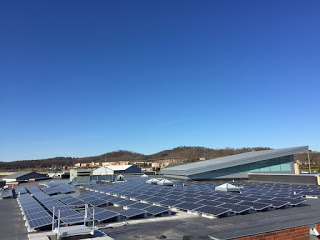
by jboullion | Dec 14, 2016 | Uncategorized
By Katherine Klausing, Engagement Manager
Wisconsin’s businesses are leading the way on solar, and they’re encouraging their colleagues do the same. That was the message last week in Onalaska, as RENEW Wisconsin’s Tyler Huebner convened a panel at the Wisconsin Sustainable Business Conference.
RENEW Wisconsin brought together executives from Gundersen Health System of La Crosse, Reynolds Transfer of Madison, and Phillips Medisize of Phillips to talk about how investing in solar energy has helped their companies save money and meet their sustainability goals.
 |
Gundersen Health Systems’ Sparta Clinic
Photo credit: Gundersen Health Systems. |
Gundersen Health Systems’ Alan Eber explained that his company is able to save significant costs by building its clinics to use about half as much energy as a typical healthcare facility. “We take the architecture guidelines of 2030 and apply them today,” said Eber, explaining how this results in much lower costs over the life of its buildings. “For us, it’s all about reducing waste.” Gundersen has invested in a 100kW solar array on top of its new clinic in Sparta. To meet its full commitment to energy independence, the company will also buy the output from 220kW of Xcel Energy’s shared solar array under development. Gundersen Health Systems has been recognized as RENEW Wisconsin’s Energy-Independence Enterprise of the Year.
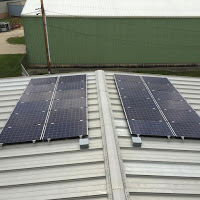 |
Reynolds Transfer and Storage’s solar
array. Photo credit: SunPeak. |
Ben Reynolds of Madison-based Reynolds Transfer and Storage also shared his positive solar experience with the crowd. Reynolds, a sixth-generation member of the family-owned business, led the procurement and installation of 48kW of solar on the company’s two warehouse facilities in Madison. Reynolds estimates that the solar array will save them about $7,500 every year, not including the money the company has saved by converting some of its power load from gas to electricity and timed its use to capitalize on the solar panels’ production. Read more about Reynolds Transfer and Storage’s solar project here.
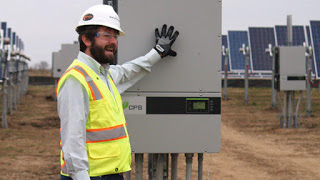 |
Jonathan Roberts of SoCore Energy shows off Dairyland
Power Cooperative’s latest solar array, located near New Richmond.
Photo credit: SoCore Energy. |
Dan Andersen of Phillips Medisize explained that his company took a different approach. The medical device manufacturer’s leaders looked into installing solar on-site, but decided they liked the ease and simplicity of investing in a shared solar array. So Phillips Medisize will buy a portion of its power every month from two new community solar arrays built in New Richmond and Eau Claire.
The Milwaukee Journal Sentinel’s Tom Content kicked off the session by sharing new national polling showing the vast and diverse support that renewable energy garners nationwide. Polling conducted by Public Opinion Strategies immediately following the November elections found that 76% of Americans support installing more solar energy.
The fact that solar energy is so popular should be of interest to businesses considering solar, pointed out RENEW’s Huebner. “Businesses that invest in solar and renewables are on the correct side of the citizens and therefore customers, suppliers, and employees.”

by jboullion | Dec 1, 2016 | Uncategorized
 Today, the Public Service Commission of Wisconsin finalized decisions related to Focus on Energy’s renewable energy program for 2017 and 2018.
Today, the Public Service Commission of Wisconsin finalized decisions related to Focus on Energy’s renewable energy program for 2017 and 2018.
Overall Funding: The first item to note is that the total funding for renewable energy incentives is now $8.6 million over the 2017-18 two-year period. This is up from $7.7 million decided in their previous meeting of October 20th, and reflects an additional $900,000 from unspent funds remaining in the now-terminated Renewable Energy Loan Fund.
Funding by Program: The Commission decided to fund programs at the following levels, largely agreeing with recommendations RENEW Wisconsin put forth in late October. Business customers will be able to take advantage of Prescriptive Incentives, which offer pre-determined levels of funding for eligible technologies like solar PV and geothermal projects, as well as the Renewable Energy Competitive Incentive Program (RECIP), which accepts competitive proposals and awards grants for larger projects.
Based on RENEW Wisconsin’s understanding of the Commission’s discussion today, we estimate the budgets accordingly.
 |
|
Note that these figures may change as more information becomes available.
|
Incentive Level for Solar PV: The Commission also adjusted the incentive levels and caps on project sizes for solar photovoltaic systems. The commission lowered the incentive from about 16% of the cost of an average project–$600 per kW–to 12% of the project cost, which will adjust yearly with average market prices. At this year’s prices, the incentive would be $450 per kW, according to Commission Chairperson Ellen Nowak. Nowak noted that the solar incentives have been very popular and fully spent down in each year and that reducing the incentive level to match falling market prices would allow more installations to be funded.
Following recommendations from staff and RENEW, the Commission also agreed to raise the maximum eligible project size from 4kW to 8kW for business customers. Residential incentive eligibility will remain capped at 4kW.
“We applaud the Commission’s decision to continue to fund these critical projects,” said Tyler Huebner, Executive Director of RENEW Wisconsin. “These highly successful incentive programs will ensure that renewable energy thrives in Wisconsin, keeping our energy costs low and our energy jobs local.”
In addition, the Commission directed $20 million in funding to expand biogas production on dairy farms. An interagency working group will release a joint RFP for a network of interconnected anaerobic digesters, which will allow manure from dairy farms to be converted into renewable natural gas. The Commission noted the many benefits that anaerobic digesters have to offer in Wisconsin, from improving water quality, to nutrient management and local, renewable energy. RENEW Wisconsin has closely followed and supported statewide initiatives to deploy biogas technologies. For more information and our take on Governor Scott Walker’s recent announcement, visit our blog.
Finally, the Commission outlined new programs for rural customers that will align greater access to broadband with participation in Focus on Energy’s efficiency programs. The Commission announced $16 million in funding for new programs that provide broadband-connected energy efficiency devices like smart thermostats and smart power strips, $4 million for energy efficiency retrofits for broadband providers’ facilities and $6 million in additional programs for agricultural energy management, rural small business support and others.

















